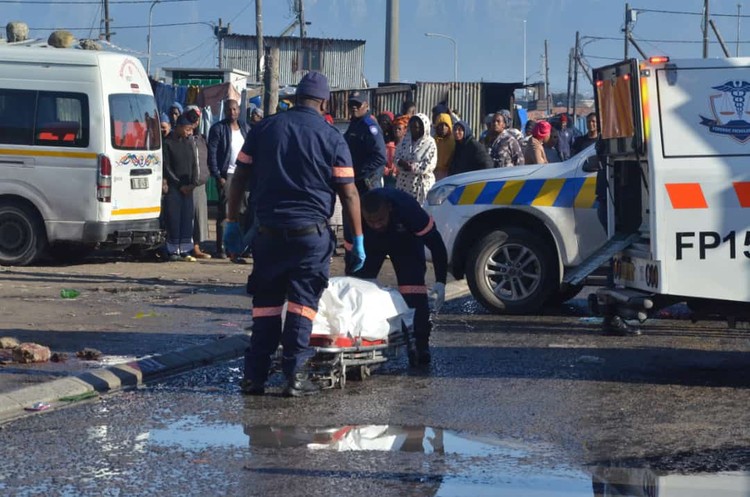
3 July 2023
Pathology staff remove the body of an unknown man who was accused of robbery, beaten and set alight in Kosovo informal settlement in Samora Machel, Cape Town, on Sunday morning. Photo: Sandiso Phaliso
A man suspected of committing robberies and other crimes around Kosovo informal settlement in Samora Machel, Cape Town, died after being beaten and set alight by community members on Sunday.
Police spokesperson Joseph Swaartbooi confirmed that Samora Machel police responded to a call at 8:30am on Sunday. “Upon arrival in White Heart Lane, they found the body of an unknown male who sustained fatal injuries. The victim was declared deceased on the scene by medical personnel. The motive for the attack is still to be confirmed.”
He said Samora Machel police were investigating murder and urged anyone with information to call Crime Stop on 08600 10111.
According to residents at the scene, word spread like wildfire that the man had tried to rob a resident. They said the man was chased, caught and stripped naked before he was beaten with sticks and large stones. A tyre was then placed around him and set alight.
In June, two men, also suspected of committing robberies, were killed by community members in nearby Philippi.
Residents told GroundUp that these killings occur because people are frustrated and have lost faith in the local police, law enforcement agencies and the justice system.
Community leader Mongezi Dala called on the South African Police Service (SAPS) to host an imbizo for people to voice their concerns and to be educated about the repercussions of taking the law into their own hands.
“The alleged criminals are tortured for hours and questioned … They are severely assaulted until they confess, sometimes confessing to crimes they did not commit,” said Dala.
“These acts of violence are no different from the death penalty and it is wrong because we have courts of law that deal with criminals. How do we expect our children to behave after seeing these incidents? Mob justice is not the way to go.”
Dala said that when they asked communities not to deal with suspected criminals themselves, they are told criminals are usually released by police within days or weeks, which frustrates people.
A resident who asked to remain anonymous told GroundUp, “People do mob justice to scare would-be criminals away. People take the law into their own hands because they are angry. If people, especially victims of crime, hear someone has been caught stealing, they rush to the scene to take revenge for what happened to them months before.
“People believe the police and the justice system are not doing enough to curb crime. There is a belief within communities that criminals live a nice life in jail, eat three meals a day, watch TV and come back to terrorise the community,” he said.
Another resident, Nkosi Mthimkhulu, said he was worried that these mob killings were traumatising children and teaching them that it is acceptable to take the law into their own hands.